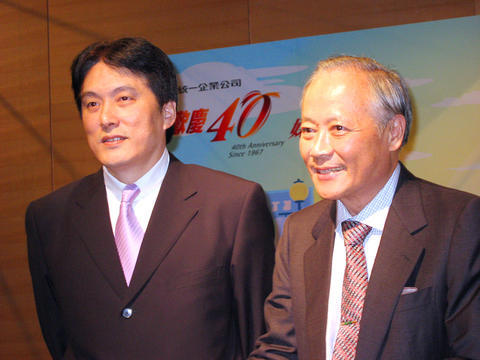Uni-President Enterprises Corp (統一企業), the nation's biggest food conglomerate, yesterday celebrated its 40th anniversary by setting a goal of becoming a market leader in Asia in the next decade.
"[Now that we have built] a solid foundation, Uni-President's strength lies in its diversification [from the food and beverage sector into service-oriented businesses such as channeling, retailing and branding]," executive president Alex Lo (羅智先) said in Kaohsiung. "[We] have the potential to outcompete other Asian players in the next 10 years."
Lo was speaking at the company's Dream Mall (

PHOTO: JOYCE HUANG, TAIPEI TIMES
In May, Lo said Uni-President aimed to best Asian competitors outside Japan within three years through acquisitions in China and India.
To outdo top-tier Japanese competitors, Uni-President Group's annual combined revenues, which reached NT$258 billion (US$7.93 billion) last year, will have to exceed the NT$400 billion level in the years to come.
Founded in August 1967, Uni-President started as a flour importer in southern Tainan's Yongkang City with an initial capital of NT$30 million. The company's capital has since grown to NT$33.5 billion and in late June the board targeted a further increase to NT$48 billion in the near future.
Uni-President employs more than 60,000 people and owns 7 brands with annual sales of NT$1 billion each as well as more than 40 brands with annual sales exceeding NT$100 million each.
With an eye on the future, the company has invested about US$350 million in China since 1992.
China contributes nearly 51 percent of the group's food business revenues, although Uni-President lags behind Taiwanese competitor Ting Hsin International Corp (頂新集團) in that market -- particularly in the instant noodle sector.
"China is a giant market. We will gradually expand our share [in the market] by increasing our investments and through mergers and acquisitions," Lo said.
While the company is bullish on China, Uni-President Group chief executive officer Jason Lin (
Value-added products sell in Taiwan, where GDP per capita is relatively high, but fail to satisfy Chinese consumers, who favor products of quantity and size with low prices.
For example, Uni-President's “Left Bank Coffee” brand had not gone down well in China, Lin said.
The company had previously said it planned to follow the lead of 50 of its Taiwanese peers by listing on the Hong Kong stock market by the end of the year. But Lo yesterday refused to reveal a timetable for the move, saying
only that “the market will decide whether we go public in Hong Kong, Bangkok or Singapore.”
Lo said that Uni-President's 40th anniversary theme was “Life of Value Evolution” (LOVE) and that the company would focus on branding and the four pillars of trade, distribution, manufacturing and strategic alliances.
“Our main goal is to facilitate a happier, better and richer life for all our customers,” he added.
Uni-President shares yesterday rose by NT$0.5, or 1.06 percent, to close at NT$47.7 on the Taiwan Stock Exchange. The stock has risen by 59.54 percent over the last 12 months.

With an approval rating of just two percent, Peruvian President Dina Boluarte might be the world’s most unpopular leader, according to pollsters. Protests greeted her rise to power 29 months ago, and have marked her entire term — joined by assorted scandals, investigations, controversies and a surge in gang violence. The 63-year-old is the target of a dozen probes, including for her alleged failure to declare gifts of luxury jewels and watches, a scandal inevitably dubbed “Rolexgate.” She is also under the microscope for a two-week undeclared absence for nose surgery — which she insists was medical, not cosmetic — and is

GROWING CONCERN: Some senior Trump administration officials opposed the UAE expansion over fears that another TSMC project could jeopardize its US investment Taiwan Semiconductor Manufacturing Co (TSMC, 台積電) is evaluating building an advanced production facility in the United Arab Emirates (UAE) and has discussed the possibility with officials in US President Donald Trump’s administration, people familiar with the matter said, in a potentially major bet on the Middle East that would only come to fruition with Washington’s approval. The company has had multiple meetings in the past few months with US Special Envoy to the Middle East Steve Witkoff and officials from MGX, an influential investment vehicle overseen by the UAE president’s brother, the people said. The conversations are a continuation of talks that

CAUTIOUS RECOVERY: While the manufacturing sector returned to growth amid the US-China trade truce, firms remain wary as uncertainty clouds the outlook, the CIER said The local manufacturing sector returned to expansion last month, as the official purchasing managers’ index (PMI) rose 2.1 points to 51.0, driven by a temporary easing in US-China trade tensions, the Chung-Hua Institution for Economic Research (CIER, 中華經濟研究院) said yesterday. The PMI gauges the health of the manufacturing industry, with readings above 50 indicating expansion and those below 50 signaling contraction. “Firms are not as pessimistic as they were in April, but they remain far from optimistic,” CIER president Lien Hsien-ming (連賢明) said at a news conference. The full impact of US tariff decisions is unlikely to become clear until later this month

Nintendo Co hopes to match the runaway success of the Switch when its leveled-up new console hits shelves on Thursday, with strong early sales expected despite the gadget’s high price. Featuring a bigger screen and more processing power, the Switch 2 is an upgrade to its predecessor, which has sold 152 million units since launching in 2017 — making it the third-best-selling video game console of all time. However, despite buzz among fans and robust demand for pre-orders, headwinds for Nintendo include uncertainty over US trade tariffs and whether enough people are willing to shell out. The Switch 2 “is priced relatively high”